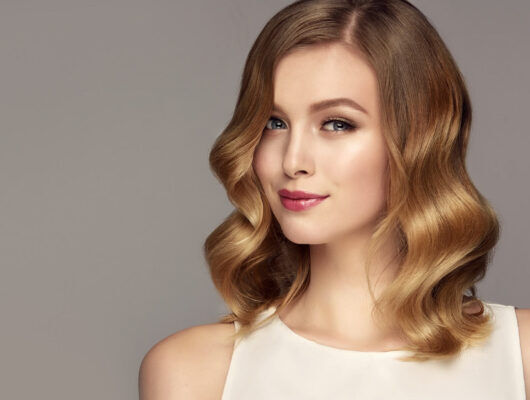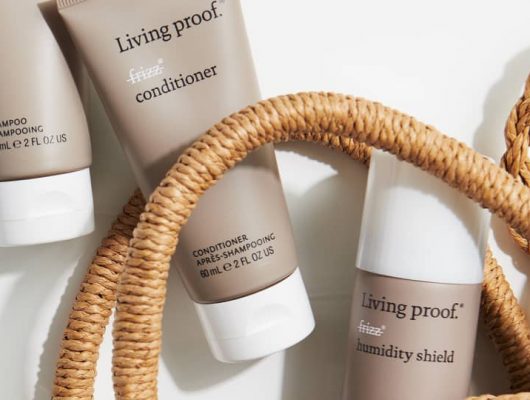
Is Silicone Bad For Your Hair? Our Experts Weigh In
Silicones in hair products are a topic of debate among haircare professionals and consumers. These ingredients — common in many shampoos, conditioners, and styling products — are known for their smoothing and shine-enhancing properties.
While some argue that silicones provide immediate benefits, such as removing tangles and adding gloss, others raise concerns about potential hair damage over time.
The haircare industry is witnessing a shift as more people take notice of the ingredients in their products. Silicone-free haircare options are gaining popularity due to their promise of maintaining hair health without the downsides associated with silicones. In this article, we’ll explore the role of silicones in hair products, their effects, and why silicone-free alternatives are now recommended. Ultimately, we tackle the important question: Is silicone bad for hair?
What is silicone?
Silicones are synthetic polymers — long, repeating chains of molecules — known for their hydrophobic properties, which repel water and create a seal over the hair shaft. This sealing action helps retain moisture within the hair
Beyond haircare, silicones are also prevalent in makeup and skincare products where they help keep skin soft and smooth. Silicones are utilized in cosmetics like lipstick and foundation to maintain their consistency and application quality and prevent them from drying out.
Types of silicones.
Silicones fit into three main groups:
- Water-soluble silicones: These can be easily washed out of the hair with water, making them less likely to build up.
- Non-water-soluble silicones: These do not dissolve in water and can accumulate on the hair over time if not thoroughly cleansed, potentially leading to buildup.
- Evaporating silicones: Often found in leave-in products, these silicones evaporate after application, leaving minimal residue on the hair.
There are various types of silicones used in haircare products. Three common types include dimethicone, cyclomethicone, and amodimethicone.
- Dimethicone: Dimethicone coats the hair, providing a sleek and shiny appearance. It’s found in many haircare products due to its ability to tame frizz and add gloss.
- Cyclomethicone: Unlike dimethicone, cyclomethicone is a lighter silicone that evaporates without leaving a heavy residue on the hair. Its lightweight nature makes it popular in lighter haircare formulations, such as leave-in conditioners and sprays, where a non-greasy feel is prioritized.
- Amodimethicone: This silicone is unique in its targeted action. It adheres to areas of the hair that are damaged, providing conditioning and protection where it’s needed most. This selective adherence makes amodimethicone a common ingredient in products designed for damaged or treated hair.
Despite their differences, these silicones share a common trait: they all form a layer around the hair shaft. However, they vary in terms of weight, longevity, and potential to build up on the hair.
What does silicone do to hair?
Silicones have both immediate and long-term effects on your hair. Understanding these effects is crucial for making informed choices about the products you use. Here are three ways silicone-based ingredients can impact your hair.
Silicones Can Keep Nutrients Out
Silicones create a coating around the hair shaft. This coating acts as a barrier, preventing essential oils and nutrients from penetrating the hair.
Over time, this barrier can lead to nutrient deprivation. Without essential nutrients, hair may become dry and brittle.
Silicones Can Cause Buildup
![]()
Frequent use of silicone-based products can lead to silicone buildup on the hair. This buildup can weigh hair down, resulting in limp and lifeless strands.
Removing silicone buildup often requires a strong clarifying shampoo. However, these shampoos can also strip the hair of natural oils, potentially leading to further dryness.
Silicones Can Lead To Damage
Continuous exposure to silicones can cause hair dryness and breakage. The initial smoothness and shine provided by silicones might mask these underlying issues.
The shine created by silicones can give the illusion of healthy hair while potentially aggravating existing hair problems.
While silicones can offer immediate aesthetic benefits such as smoothness and shine, they may also contribute to long-term hair issues like nutrient blockage, buildup, and damage. It’s important to consider these factors when choosing haircare products.
Is silicone bad for hair?
In the haircare industry, there are differing views regarding the impact of silicone on hair. Many hair professionals and brands advocate for the immediate benefits of silicones, such as detangling and added shine, which can make hair feel luxurious upon application.
On the other hand, there is a significant concern about the long-term effects of silicone use. Critics of silicone in hair products point to issues such as nutrient lockout and buildup. Over time, these issues can weaken hair, affecting both its strength and appearance.
At Living Proof, our approach is informed by these concerns. We consciously choose to exclude silicones from our formulations, aiming to provide a healthier, long-term solution for haircare. This decision is based on the belief that hair health should not be compromised for temporary aesthetic benefits.
“Understanding the concerns around silicones, we focus on the bigger picture of hair health. Our research reveals that while silicones may initially give a feeling of smoothness, they contribute to a cycle of buildup and increased washing frequency, which in turn can lead to hair damage. We’ve embraced innovative alternatives to silicones in our formulations, ensuring that our products not only enhance hair’s natural beauty but also support its long-term health and resilience.” — Olivia, Product Development Team, Living Proof
Our commitment at Living Proof is to deliver haircare that supports and enhances the natural health of your hair, steering clear of quick fixes that might lead to adverse effects over time.
How to go silicone-free.
Transitioning from silicone-based to silicone-free hair products is part of the journey toward healthier hair. Here’s your guide to making this change, focusing on the benefits of Living Proof’s silicone-free solutions.
Seek Out Silicone Alternatives
Explore natural oils like argan, coconut, or jojoba for smoothing and shine. These can be effective replacements for silicones.
Additionally, check out Living Proof’s range of haircare solutions developed without silicones, including:
We pride ourselves on creating innovative HairTech alternatives that nurture your hair’s natural health.
Switch Up Your Routine
Instead of abruptly switching products, gradually phase out your silicone-based products to allow your hair to adjust. Pay attention to how your hair responds and alter your routine as needed. Using a clarifying shampoo can be crucial for removing any existing silicone buildup. Since silicones often mask dryness, incorporating a deep conditioning treatment into your routine can be beneficial.
Lastly, understand that your hair may not instantly be as shiny or smooth without silicones, but this is part of the natural process of achieving healthier hair.
By following these guidelines, you can effectively transition to a silicone-free haircare regimen, ensuring the health and beauty of your hair with Living Proof’s advanced haircare solutions.
Embrace silicone-free haircare.
![]()
Understanding the impact of silicones on hair and the benefits of silicone-free alternatives is essential for maintaining long-term hair health.
At Living Proof, we advocate for a mindful approach to haircare, prioritizing long-term health and natural brilliance. We encourage you to explore our silicone-free products designed to nurture your hair’s true potential.
Ready to find the ideal haircare routine for your needs? Take our Hair Quiz and uncover healthier, more beautiful hair with Living Proof’s silicone-free solutions.
FAQs
Should I use silicone-free shampoo and conditioner?
Using silicone-free shampoo and conditioner depends on your hair type and health goals. If you’re looking to avoid buildup and maintain the natural health of your hair, silicone-free products are a good choice. They help ensure that your hair receives essential nutrients without the risk of long-term damage.
How do I find the best silicone-free hair products?
Look for products that clearly state they are silicone-free. Check the ingredient list for silicones such as dimethicone or cyclomethicone. Brands like Living Proof offer a range of silicone-free options.
What hair types can tolerate silicones?
While most hair types can tolerate silicones in the short term, those with fine or low-porosity hair might experience buildup more quickly. Individuals with thicker, more porous hair may not notice the effects of silicones as apparently.
Should I use products with silicones?
Silicones provide immediate benefits such as smoothness and shine but can lead to buildup and long-term hair damage. If you prefer long-term health over short-term aesthetics, consider silicone-free products.
What ingredients should I look out for?
Apart from silicones, be cautious of sulfates and parabens, which can be harsh on hair. Look for nourishing ingredients like natural oils and proteins.
Are silicones bad for the environment?
Silicones are synthetic and not biodegradable, which can pose environmental concerns. They may accumulate in water systems, affecting aquatic life.
Why are silicones in hair products?
Silicones are used in hair products for their ability to provide immediate benefits such as detangling, adding shine, and smoothing frizz. They form a protective coating on the hair, resulting in a polished look.



